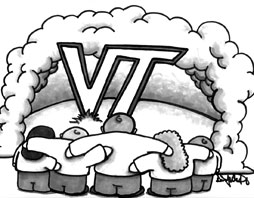By Amanda Alcover-Migura/reporter
America is experiencing an insoluble moral dilemma, a noted historian told a NE Campus audience April 12.
Faculty and students filled the Center Corner to hear Dr. Paul Hendrickson, an award-winning author, speak on the art of storytelling.
The author of Sons of Mississippi, Hendrickson explained how he was driven to write the story.
“ We are meant to tell one another stories as a way of keeping afloat,” he said. “I always thought stories find us, rather we them.”
Hendrickson said telling stories can be powerful and there are stories all around waiting to be told.
Sons of Mississippi tells of seven sheriffs in the 1960s and the war blacks fought to gain equal rights in the United States. The story takes place on the campus of the University of Mississippi, or Ol’ Miss as it is commonly called.
His work profiles the seven sheriffs who were associated with the riots before the integration of the University.
Hendrickson described the conflicts of racism as an “ark of sorrow” that people have been struggling with for more than 200 years. He said he found inspiration for his work from a photograph in the book Powerful Days by Charles Moore.
“ In a split second, I was rooted to the floor looking at this photograph,” he said.
Hendrickson said the picture has an overwhelming storytelling quality, yet a blinding confusion. He said he felt a strange terror looking at the photograph and questions began to flow.
“ Who were these men? How did they get there? What were their legacies?” he wanted to know.
The legacies of these seven men became Hendrickson’s focal point. During the research stages of the book, he found the remaining men from the photograph and learned their hatred and racism had passed down for two generations.
He described that find as his journalistic luck.
“ It’s a leap of faith,” he said. “If you go, it will happen.”
He said writers act as receivers of strange messages and are there to tell the stories the world waits to hear.
Quoting the Talmud, Hendrickson said he found blades of hope in Mississippi.
“ Every blade of grass has an angel that bends over it and whispers ‘grow,’” he said.
Hendrickson said the blades refer to the progress people make, but then fall back and have to work hard again to move forward.
People are susceptible to trampling and must keep fighting for the glory.
During his speech, he said he was impressed that Tarrant County College had been the opening venue for the recent FDR exhibit of photographs from the Great Depression. The author was scheduled to speak during the exhibit but had to cancel because of health problems.
The NE Campus history department and Paula Vastine, director of student developmental services, sponsored the FDR exhibit and the lecture series built around the exhibit.
Vastine said the speaker, whose central message stressed the point of the true importance of the story behind the story, was impressive.
“ From one picture, he could not only write a book, but tell the story,” she said.
Hendrickson wrote for The Washington Post for more than 20 years as well as earning several honors and recognitions for his many books. He is now a professor at the University of Pennsylvania, where he teaches creative writing.
He said he was in Texas not only to speak on behalf of his book Sons of Mississippi, but to chase the “story” behind his next book.

























